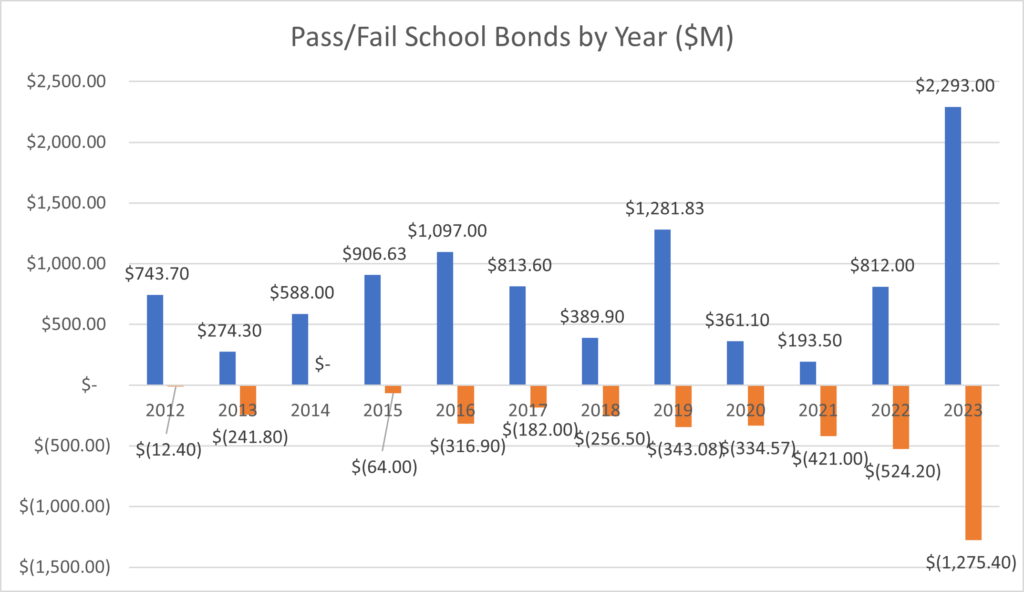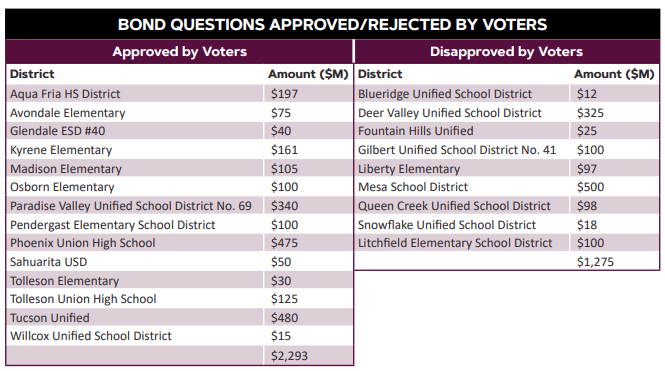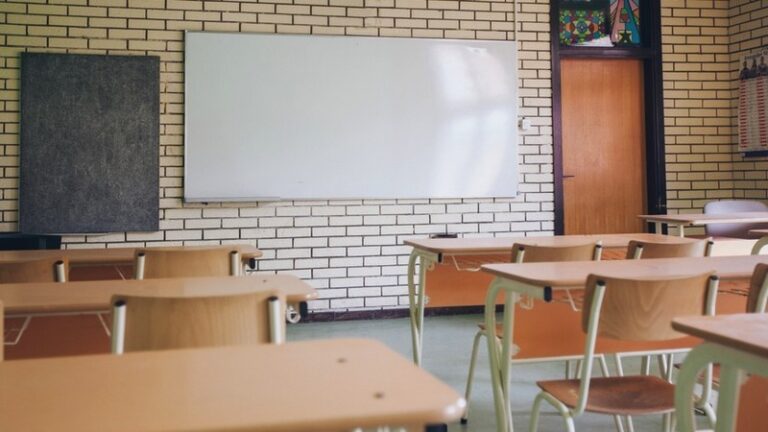By Rebekah Morris for AZBEX
No matter the end result, 2023 was going to set records for bond questions asked of voters. Twenty-three school districts across the state requested authorization from voters to take on more than $3.56B in debt to fund capital projects and land purchases. In addition, five cities in Maricopa County also requested General Obligation bond approval totaling more than $1B.
As of Thursday afternoon, 15 of the 23 school bond questions totaling $2.39B appear to be passing, and four of the five municipalities requesting bonds totaling $992M are moving forward.
Glendale, Goodyear, Phoenix and Surprise Pass Bonds Totaling $992M
Four large cities asking for bond approval all appear headed for approval. Only the City of El Mirage was unsuccessful at securing approval of their $42M bond request.
Phoenix voters approved a total of $500M in four bond requests to fund a wide variety of capital projects such as Public Safety, Streets and Storm Drainage, Parks & Recreation, Arts & Culture, Economic Development, Environment & Sustainability, and Housing.
Goodyear has approval to secure $232M in funding for projects that include: $135M for Streets & Transportation, $80M for Public Safety projects and $17M for Parks & Recreation projects.
Glendale‘s 2023 GO bond program totaled $160M and was split into two parts: $82M for Streets and intersection improvements and $78M for Public Safety projects.
Surprise voters approved a total of $100M in GO bond authorization to fund two types of projects: $66M for Transportation and $34M for Public Safety.
Fifteen K-12 School Districts Secure $2.39B in Bonding Authority
This year’s roundup of K-12 bond questions was already projected to be more than 3.5x the average ask. Between 2012 and 2022, voters were asked, on average, to approve $923M. This year’s total request of $3.568B is more than double the highest year we have recorded (2019’s $1.6B).
In that same timeframe, an average of 71% of those dollars was approved by voters. This year’s total pass rate of $67.06% missed that by just a bit, but it is significantly better than the years of 2020 and 2021, where a full 48% and 68% in K-12 bond dollars, respectively, were rejected by voters.
Bonding enables school districts to fund major capital projects such as new school construction and renovation, HVAC replacements, roofing and interiors. Also included in capital purchases are buses and land.
Bonds are the predominant method for funding new school construction in Arizona. The state does not adequately fund school facilities, despite the legal responsibility to do so. In fact, a major lawsuit originally filed in 2017 is expected to go to trial in May 2024.
Typically, bonds take five-to-six years for the district to fully expend. Some districts—such as Paradise Valley Unified School District, Tolleson Union High School District and Tempe Elementary School District—routinely ask voters for new bond authorization every few years.
For the third year in a row, Queen Creek voters have declined to support bond funding for new school construction. In 2021, 2022 and 2023 voters rejected bond questions in the amounts of $286M, $198M and $98M. However, in January 2023, the School Facilities Oversight Board approved $70M in funding to ease overcrowding and build new facilities.
The other notable high-growth area where voters have repeatedly denied the local district the authority to take on bond debt to finance new school construction is Peoria. Voters declined bond questions on the ballot in 2016, 2018 and 2020. The Peoria Unified School District Board declined to ask voters again in 2023.
Mesa Unified and Gilbert Unified School Districts have enjoyed support from voters in the past, but this year was different. Voters rejected a $500M question for Mesa schools and a $325M question for Gilbert.
No matter how you frame the results, Arizona school construction is about to see a surge in activity with new projects across more than a dozen districts that were successful in securing voter approval for bond financing.



